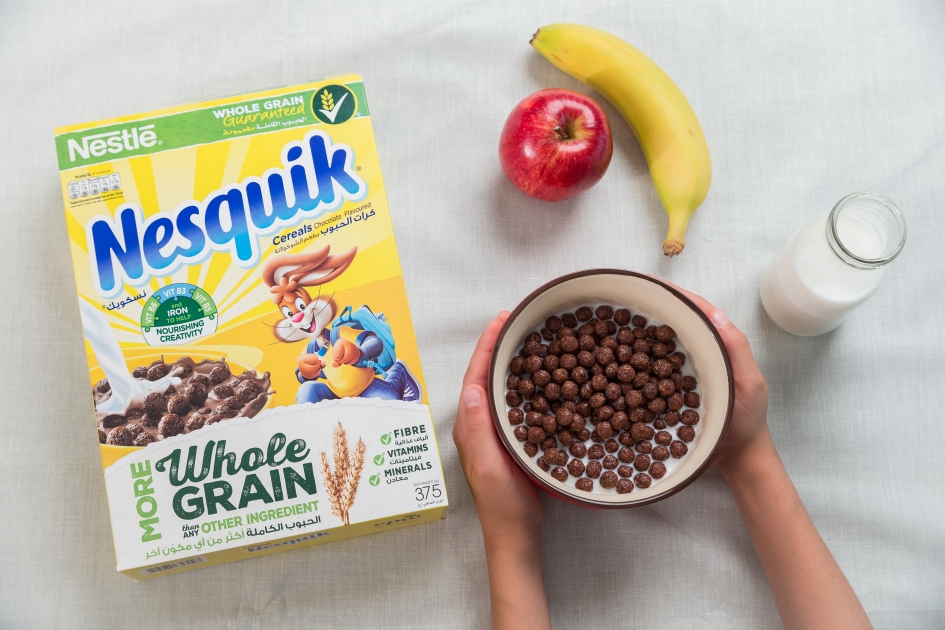
Celebrate World Cereal Month with a Whole Grain Breakfast!
It’s not a myth or an old wives’ tale, Nutrition Experts around the world recommend everyone, young or old; a healthy balanced breakfast, everyday! Why? Because it provides the body with the energy and nutrients needed to kick-start the day and needed to prepare the body for a day full of activities. It is very critical for children and is considered the most important meal of the day.
Time and again, numerous studies have shown that breakfast is the most important meal of the day, and children who eat breakfast regularly have a more balanced diet including more fruits and more milk and healthier lifestyles? than those who skip breakfast1, 2. In addition, research shows that children who skip breakfast may not make up for the nutrients they miss when skipping that meal9.
As shown in the figure below, research has shown that rates of overweight and obesity are a lot higher in children who skip breakfast or have smaller meals which in turn affects their day-to-day performance in school as well.
Figure 18. Percentage (%) of children who do not consume breakfast regularly (on a daily basis)
Abbreviations: KSA: Kingdom of Saudi-Arabia; UAE: United Arab Emirates
Before we get into the nitty gritty of why breakfast along with wholegrains is important, let’s decipher what is considered a ‘healthy breakfast’?
The key to a nutritious breakfast is variety, which can be achieved by including as many of the four food groups (Breads and Cereals, Fruits & Vegetables, Meat & Legumes and Milk & Dairy) as well as the right quality of food choices. But not all breakfasts are the same: Quality and Quantity matters!
A nutritious balanced breakfast such as a bowl of whole grain breakfast cereals and milk along with a fruit would provide adequate energy for the body as well as a variety of essential nutrients such as B-vitamins, Iron, Zinc and Calcium specifically needed for children’s growth and development.
- A serving of ready-to-eat breakfast cereal serves as an excellent centerpiece for a balanced breakfast being low in fat, nutrient-dense, cholesterol-free foods that are often fortified with essential vitamins and minerals and plays a key role in helping consumers of all ages move towards a healthy, balanced diet.
- Ready-to-eat breakfast cereal encourages increased consumption of milk and possibly fruit. Consuming milk and milk products (yogurt and cheese) is associated with overall diet quality and adequate intake of several nutrients, including calcium, potassium, magnesium, zinc, riboflavin, folate and vitamin D* among children and older adults.
- Breakfast cereals help promote bone health combined with calcium, vitamin D and protein provided from milk and milk products that are often consumed with RTEC, make this combination an excellent choice for bone health and development; especially in children.
We have given you many reasons to understand why breakfast is important, however, we still haven’t established what is whole grain and why is it important?
Whole grains have all the parts of the original kernel—bran, germ, and endosperm—in the original proportions and together deliver a package of important nutrients. Fiber is one big reason to eat whole grains. Adults need about 25 to 35 grams of fiber daily, and whole grains contain two types—soluble and insoluble—which are both beneficial to your health.
Why Whole Grain:
Whole grains deliver many important nutrients. Here are some of the key nutrients found in whole grains:
- Fiber: The bran provides most of the fiber in whole grains.
- Vitamins: Whole grains are particularly high in B vitamins, including niacin, thiamin and folate.
- Minerals: They also contain a good amount of minerals, such as zinc, iron, magnesium and manganese.
- Protein: Whole grains provide several grams of protein per serving.
- Antioxidants: Several compounds in whole grains act as antioxidants. These include phytic acid, lignin and sulfur compounds.
- Plant compounds: Whole grains deliver many types of plant compounds that play a role in preventing disease. These include lignans, stanols and sterols.
However, there has been a significant confusion among consumers in Middle East about how much whole grain should be consumed daily. While almost eight in 10 people (80%) believe it is important to eat whole grain, more people (86%) admit they don’t know how much they should consume. Half of those surveyed think they eat enough.
How to go Whole grain?
- Check for ‘whole grain’ as the first ingredient on the label
- Swap refined (‘white’) bread, rice or pasta for whole grain varieties
- Choose a whole grain cereal for breakfast such as Nestlé Fitness and Nesquik Cereals
- Add another portion of whole grain for lunch and dinner, e.g. whole grain bread, whole grain pasta, or brown rice
- Look out for logos which highlight whole grain


























